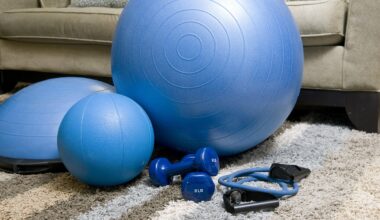How to Fuel Your Body for Optimal Performance with Resistance Bands
When practicing workouts with resistance bands, nutrition plays a significant role in performance. Properly fueling your body enhances muscle recovery, stamina, and gains. Thus, understanding the right foods can make a critical difference in how you feel and perform. Start by focusing on whole foods, rich in vitamins and minerals, as they will provide the necessary nutrients. Think about incorporating lean proteins, healthy fats, and whole grains. Examples include chicken, fish, eggs, nuts, avocados, quinoa, and brown rice. These foods help give energy and support muscle repair and growth after your workouts. Additionally, staying hydrated is paramount during resistance band training. Your body requires fluid to function optimally; therefore, drink plenty of water before, during, and after your sessions. Furthermore, consider the timing of your meals. Eating a balanced meal about two hours before working out can optimize energy levels and performance. Ultimately, personal preferences come into play; listen to your body and adjust your nutrition plan accordingly.
Incorporating Protein into Your Diet
Incorporating protein into your diet is essential to maximize the benefits of resistance band workouts. Protein plays an important role in muscle repair, growth, and overall recovery. Aim to consume quality protein sources after a workout to help with muscle synthesis. Foods rich in protein include lean meats, fish, dairy products, and plant-based options like lentils, beans, and tofu. For example, a chicken breast or a leafy green salad topped with chickpeas can be an excellent post-workout meal. Not only do these foods contain high protein, but they are also paired with essential nutrients and fiber, benefiting your overall health. Some individuals may also consider using protein supplements, such as whey protein powder, to conveniently increase their intake. However, choosing whole food sources remains the best approach for comprehensive nutritional benefits. Don’t forget to consider your individual fitness goals; protein requirements vary based on activity levels and body composition. Eating enough protein will ensure your muscles recover properly, enabling you to persist with resistance bands while gaining strength and endurance.
Healthy fats are another essential component of a balanced diet when participating in resistance band workouts. These fats provide long-lasting energy and support overall health. Foods rich in healthy fats include avocados, nuts, seeds, and fish. For instance, incorporating fatty fish like salmon into your meals can enhance omega-3 fatty acid intake, promoting heart health and reducing inflammation. Healthy fats also aid in the absorption of fat-soluble vitamins such as A, D, E, and K. Additionally, consuming fats can help you feel fuller longer and prevent unhealthy snacking. When preparing meals, consider adding a handful of nuts to salads or snacks for added texture and benefits. Oils, such as olive oil and coconut oil, are also excellent options for cooking or drizzling over dishes. However, moderation is key as fats are calorie-dense, and it’s essential to monitor portion sizes. Balance your diet by ensuring that you combine healthy fat, protein, and carbohydrates to meet your energy demands. This balance will enable you to sustain optimal performance throughout your resistance band workouts.
The Importance of Carbohydrates
Carbohydrates are crucial when it comes to fueling your resistance band workouts effectively. They act as the primary source of energy for your body during high-intensity training sessions. Simple carbohydrates, like fruits and some starchy vegetables, can provide instant energy. Meanwhile, complex carbohydrates, such as oats, whole grains, and brown rice, supply prolonged energy required during longer workout sets. When planning meals, consider pairing these carbs with protein and healthy fats to create balanced dishes that enhance energy availability. For example, a bowl of oatmeal topped with fruit and nuts offers a delicious and nutritious breakfast before your workout. It’s also essential to replenish your carbohydrate stores after your sessions. Consuming carbs post-workout helps restore glycogen levels in muscles depleted during exercise. This practice speeds up recovery and prepares you for your next training session. Experiment with different carbohydrate-rich foods to discover what works best for your body. Listening to your body’s needs can help optimize performance and maintain consistency with resistance band exercises.
Staying hydrated may seem basic, but water’s importance cannot be overstated for performance during resistance band workouts. Proper hydration regulates body temperature, lubricates joints, and supports overall bodily functions. It also aids in nutrient transportation, which is essential during physically demanding activities. To ensure adequate hydration, drink water regularly throughout the day and pay particular attention before and after workouts. Electrolyte balance is also an important consideration, especially if engaging in prolonged or vigorous training. Consuming beverages enriched with electrolytes—especially after intense sessions—can help replenish what is lost through sweat. Coconut water or sports drinks can serve as potential options if you need extra electrolyte support. During workouts, sip on water every 15 to 20 minutes to maintain hydration levels. Note that feelings of thirst are usually indicators of dehydration, so being proactive is key. Increasing your fluid intake during warm weather or when increasing your activity level is vital. Overall, maintaining proper hydration supports peak performance and significantly enhances the benefits of resistance band exercises.
Meal Timing and Frequency
Understanding meal timing and frequency is critical for maximizing performance during resistance band workouts. Timing your meals effectively ensures your body has adequate energy when engaging in physical activity. Typically, aim to eat a balanced meal containing carbohydrates, protein, and fats about two hours before your workout. This will allow your body to adequately digest and prepare for exercise. If you cannot have a full meal, try consuming a small snack, like a banana with nut butter or a smoothie, closer to workout time. After your workout, aim to refuel within 30 minutes by consuming another balanced meal or snack to support muscle recovery. Meals should continue to be spaced by three to four hours to keep energy levels stable. Mind your body’s hunger cues; consistency is vital. Eating multiple smaller meals can often be more beneficial than a few larger ones. Adjust meal frequency based on individual requirements and preferences. Developing a substantial meal plan tailored to your workout routine can help ensure that you are consistently fueling your body appropriately, maintaining energy, and achieving optimal performance.
Supplements may be a component to consider when you need that extra boost for your resistance band workouts. While a balanced diet is crucial, some individuals find that supplements can help fill nutritional gaps or enhance performance. Popular options include protein powders, creatine, omega-3 fatty acids, and branched-chain amino acids (BCAAs). Protein powders can help those who struggle to consume enough protein daily, ensuring muscle repair and growth post-exercise. Creatine is beneficial for enhancing strength and endurance during workouts. Meanwhile, omega-3s support heart health and reduce inflammation. Finally, BCAAs can help decrease muscle soreness and improve recovery times after intense workouts. However, it is essential to consult with a healthcare professional or a registered dietitian before starting any supplements to evaluate your needs. Furthermore, prioritize obtaining nutrients from whole food sources first. Supplements should complement, not replace, a nutritious diet. Taking a well-rounded approach to nutrition and supplementation ensures you experience the best benefits from resistance band training while supporting overall health.


